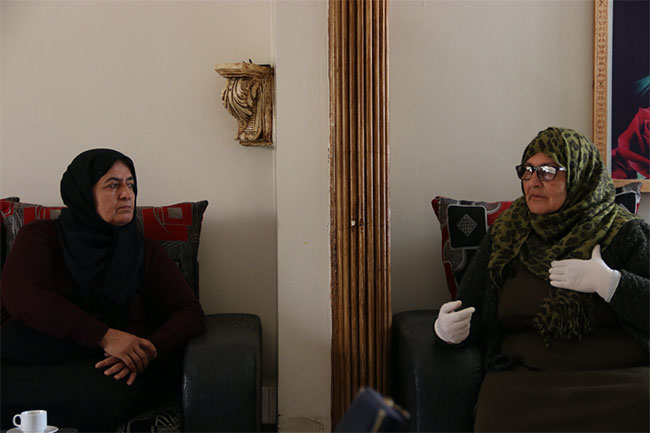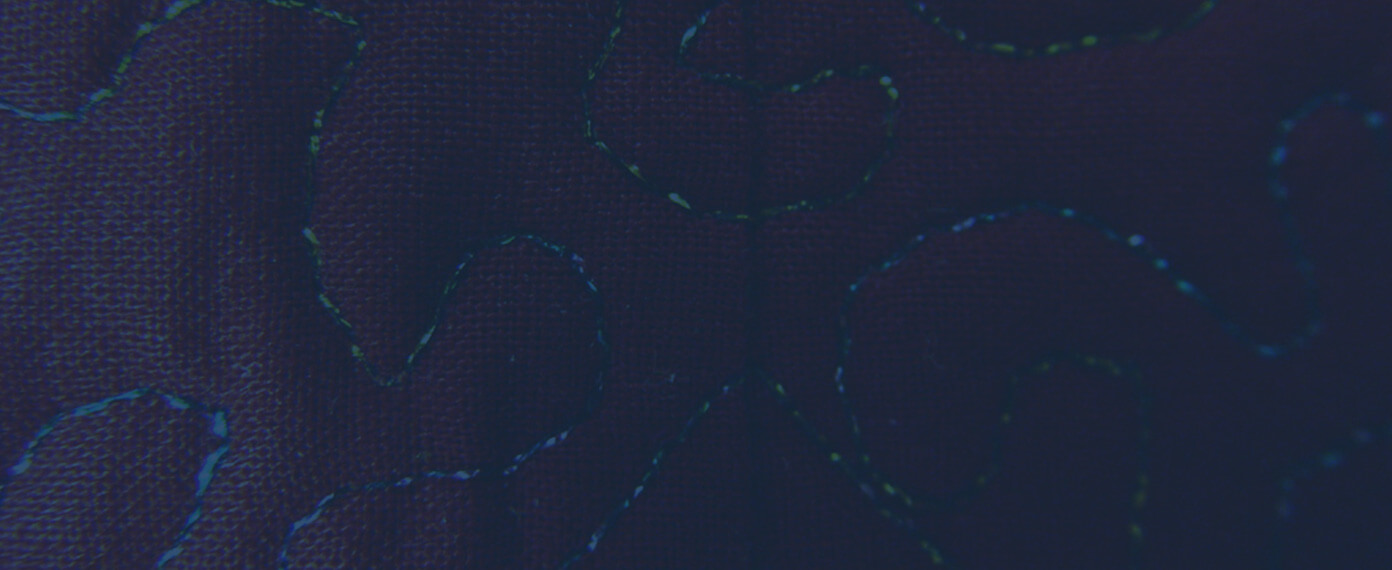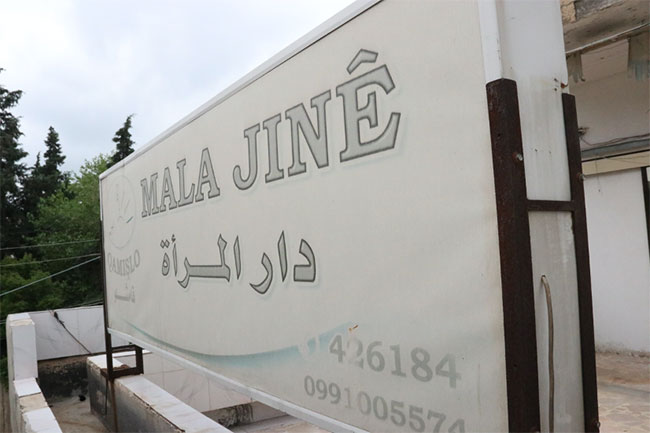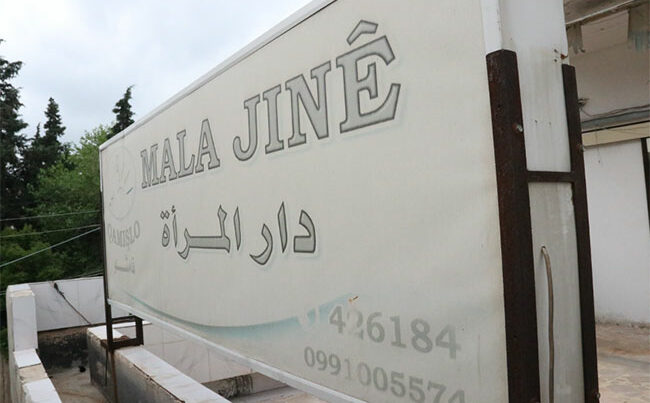Thanks to the primarily-Kurdish female fighters in the YPJ militia, many people now know that a women’s revolution is underway in North and East Syria (NES), the autonomous region more commonly known as Rojava. Women are organizing autonomously in civil society, and participating as co-chairs with guaranteed 50% representation from the highest levels of the new administration all the way down to the communes which are the building-blocks of local democracy.
Among the busiest and most vibrant centers of the new democracy in NES are the Women’s Houses, centers which can be found in each of the region’s cities and towns. Their doors are open to any woman seeking assistance, advice or mediation from a team of local mothers, grandmothers and female community leaders.
To understand more about these unique institutions, we spoke with Ilham Omer and Bahiya Murad, founders and co-chairs of the original Mala Jin (Women’s House) in Qamishlo and members of the Women’s Council of Justice in the Jazira region of NES. The interview was conducted by Rojava Information Center on March 29, 2020, and has been edited for length and clarity.

Rojava Information Center • How did the Women’s House project begin?
Ilham Omer • Our political organizing among local women has been going on for years, but in secret. I became deaf in my right ear following a beating at the hands of the regime in 1988. They didn’t accept that women were organizing autonomously.
When we began to work openly, on March 20, 2011, we were both excited and afraid because we knew of the difficulties that we would face. We were thinking about how to set women free and permit them to live on an equal basis in their family and their neighbourhood and how to help women know themselves better and to organize themselves politically within their society.
At that time, we were the only three members, and so we encountered many obstacles. We often sat and discussed how we could come to be accepted by our society.
RIC • How does the Women’s House go about its work?
Bahiya Murad • When a woman faces a problem, first, we sit down separately with the wife and discuss with her and then, with the husband. Then, we gather them together to discuss their views, understand one another and come to a common understanding.
Our aim is to solve problems through dialogue, without resorting to the courts. When we cannot solve a case, we refer it to the Court of Justice. But often, they send the case back to us because we are more capable of bringing about reconciliation and consensus.
This is the opposite of ISIS’s thinking: we are organized as a group, without hierarchy; an equal system in which no viewpoint is imposed from above.
IO • The women who come to us have nothing, just hungry babies in their arms. We are happy to sit and discuss with them for three hours. We don’t approach them with any force – just as women, as we have learned to discuss matters as mothers. We hear both sides, advise and try to find a solution.
We go to the families and discuss the problems and make sure everyone knows what rights they have. Often, we approach the situation on the basis of people’s views. If they are Muslims, we ask why they go against Islam.
BM • In 2014, the Autonomous Administration of North and East Syria adopted new laws on women’s rights. They were absolutely necessary because in our society, many young girls and women were being married off, raped, subjected to abuse. Particularly in times of war, backwards practices come to the fore.
As the Women’s House, we see the need for these laws, which protect women and families, children and men and enable us to resolve disputes that emerge in couples. They also ensure people’s rights are respected when a divorce takes place.
IO • But we don’t always accept the courts’ decisions. In Heseke, a man killed his wife and was sentenced to only four years in jail. We brought hundreds of women to the streets to protest and they changed the sentence to fifteen years.
We have also taken a lot of initiatives in the economic field. We have provided employment opportunities for women, such as those who are getting divorced, fleeing abusive relationships, whose husbands died in the war or who otherwise need support. This allows them to develop autonomy. We have also set up refuges for women so that they have somewhere safe to go if they need to flee the home.
We also conduct parallel educational projects and give lessons to academies, families and in the communes [the neighbourhood and village-level assemblies which are the building-blocks of direct democracy in Rojava]. We gather together women from five of the communes and deliver education programmes on, for example, women’s rights or the dangers of the ISIS mentality, or perhaps we bring a women’s doctor there to discuss women’s health issues. We even have our own radio show.
RIC • Can you give some examples of cases that you have worked on?
IO • In the early years of the revolution, there was still no security service. We discovered that a woman was being abused and kept in her home against her will. We didn’t have any guns or anyone to protect us, but as we pretended that we were interested in buying the home, the man let us in. I said I needed to go to the kitchen and saw that the woman was chained there. We were able to rescue the woman, find work for her as a tailor and a safe place for her to live with her children.
BM • Up until now, most of the cases we have seen are related to female teenagers who come to us seeking a divorce. In our society, divorce has many consequences and is seen as very grave. For example, in an Arab area, a girl might be expected to marry at the age of 14. We speak to her and ensure that her right to make her own decision is respected.
IO • Especially because of the war, people became very poor and so, they seek to marry off their daughters at a young age [to receive a dowry and have less mouths to feed at home]. We also deal with cases where men are seeking to remarry even when their current wife lives in poverty, or go to Europe and abandon their wives, leaving them without a breadwinner. We collect money for families who need financial support or those who are sick and cannot work and support women who want to leave home and study. There are also orphanages for children whose families can’t afford to care for them.
On the other hand, sometimes women want to marry but their families don’t allow it. We speak to the man and see if he is a good man and if so, we speak to the family… and get invited to the wedding in the end!
RIC • How has the project spread and developed?
IO • Our work started in Qamishlo. The first Women’s House opened here. The second opened in the city of Afrin, which has now been occupied by Turkish forces. After that we opened another one in Kobane and continued expanding into other regions. When new territories were liberated from ISIS, we opened a Women’s House there – in Til Hemis, Til Kocher, Til Berak. One year after Raqqa was liberated, we travelled there and set up a Women’s House. We give a lot of importance to our projects in Raqqa and other Arab regions such as Tabqa, Manbij and Deir-ez-Zor. There are twenty Women’s Houses now. More recently, two new houses have been set up by the Syriac Christian community. Our Christian sisters also struggle with a lack of rights in areas such as divorce.
BM • At the Qamishlo Women’s House, we used to deal with 70 to 80 cases a month. Now, we’re down to 30 to 45, but this is because we’ve been successful in our educational programmes and in transferring responsibility to the local communes. Women can now discuss their problems there instead.
RIC • How are women’s rights evolving in North and East Syria?
IO • The war in Syria, and in Rojava in particular, has brought a lot of damage and suffering and required many sacrifices. Women, in particular, paid a high price in this revolution to defend themselves, their families and their societies. Thousands of women from Idlib, Tel Abyad, Sere Kaniye and Afrin are suffering in tents in refugee camps because their houses have been destroyed.
On the other hand, before the revolution, women were the victims of a lot of abuses. Their rights were not recognized. They lived in hardship and violence. But that was hidden and no force would support them. Now, thanks to the revolution, great changes have been carried out. People’s mentalities have evolved. Equality has advanced. Our society is correcting its mistakes. A lot of women have sacrificed themselves for the freedom that we now enjoy.
To keep going forward, education is the most important thing. We need to make sure that the rights which women have won are passed on to their children. We need to install the rights of women in the hearts of fathers and men.
RIC • What difficulties do you face in your work?
IO • We have particularly encountered difficulties with our Arab brothers and sisters because of the tradition of polygamy, and the fact that they often took children as wives. Now, this is officially forbidden and so, many people have come to support us. But we still face dangers. Several years ago, men attacked me as I was walking to the Women’s House in Qamishlo. They grabbed me and tried to throw me into a van. I believe they were linked to the Syrian regime. Last year, the Women’s House in Deir-ez-Zor was attacked by men on motorbikes with machine guns.
BM • In the past, people called Mala Jin the Mala Berdanî (‘House of Divorce’) or the Mala Xirabî (‘House of Destruction’). They accused us of promoting divorce among the people and spreading discontent. Now, people have come to understand that we are not a place of divorce, but rather an institution that endeavours to solve problems and to reconcile society – both men and women.
IO • Now, even men come to us when they have problems – for example, there was a man linked to the regime whose wife hit him and split open his head and even he came to us for help.

RIC • How are you spreading these ideas?
IO • Now, the territories of the Autonomous Administration have expanded and different communities among the IDPs come to us for assistance in solving their problems. We work to support women who have lost all their rights, to create a healthy society and to prevent abuses, placing special importance on our work in Arab communities and those recently liberated from ISIS. We have three teams working in camps among women who joined or lived under ISIS.
This is very hard work, but we have seen some changes. For example, there is one German woman who used to call me “kuffar” [infidel] and always wore a niqab. But we talked at great length and now, when I see her in the camp, she walks about with an open face. The kinds of education programmes that you need for these women are different from the ones for women in civil society. It’s something we are working on with [the local women’s movement] Kongreya-Star: to bring deradicalization programmes to Hol Camp [home to 10,000 foreign, ISIS-linked women and children, plus 60,000 locals, many with ties to ISIS].
A project like ours doesn’t exist anywhere else in the world, but these ideas are spreading. Now, women’s councils are being set up in Europe based on the methods we have created in Kurdistan. We are ready to speak with women anywhere in the world by WhatsApp and help them set up similar programmes. We are also pleased that volunteers and revolutionaries come to us to work with us and support human rights together. We thank them and pay tribute to them. This shows that humanity still exists in the world.
We are not politicians and we are not soldiers. We are mothers whose children were lost in the war against ISIS and Turkey. All we want is peace – but it takes work to build peace.

